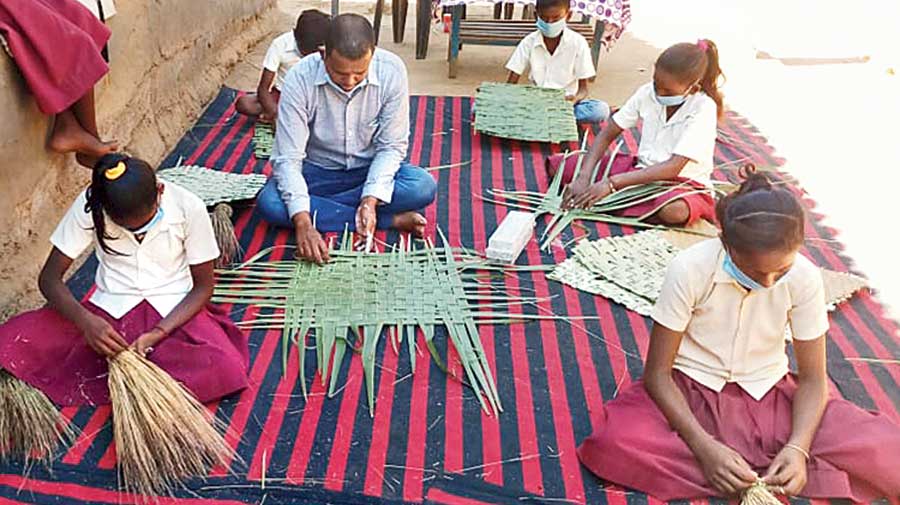A headmaster in a remote Jharkhand village is helping students become atmanirbhar (self-reliant) amid the pandemic by making them learn how to make chalk, mats, brooms, handicrafts and carry out gardening.
Sapan Kumar, the 42-year-old headmaster of Utkramit Madhya Vidyalaya (Upgraded Middle School) at Dumarthar village in Dumka district, had shot into limelight a few months back for using an innovative method to help students overcome difficulties in attending online classes by encouraging the children to use the walls in their houses as blackboards to write down class assignments under the supervision of teachers.
“Dumarthar is inhabited mainly by Santhals who are mostly farmers or contract workers and are very poor. Out of the 302 students (158 boys and 144 girls) in our school, only 10-15 students have smartphones. We were worried about how to continue their education after the school was closed due to the pandemic and conducting online classes was next to impossible. So we divided the village into four sections. Each section was given to one teacher (there are four teachers, including the headmaster) to supervise students who will have to write down the lessons using the walls of their houses as blackboards,” said Kumar.
After the success of the innovative idea under the supervision of teachers who are equipped with Bluetooth-enabled microphone to sort out queries of the students in the last few months, the headmaster was faced with another problem.
“Though initially we provided students with chalk pieces. But later on our hands became tied as the cost of purchasing chalk was quite high. So I decided to talk to my friends and arrange plaster of Paris and moulds and trained the students to make white chalk. Now we make 200 pieces of chalk daily and do not have to purchase it from the market,” said Kumar.
Students who faced problems in getting mats to site near their houses for the classes were also trained to make mats using date palm leaves.
“We started using dry date palm leaves to weave it into a mat which could be used for students to sit. We also use wild grasses to make brooms which are used to clean the places where the students sit. All these activities had a positive impact on students who were inspired not only to keep their houses clean but also keep the lanes near their homes clean,” the headmaster said.
Students are also being given information on growing vegetables and flowering plants and plantation methods for rabi and kharif crops. Girl students are also being trained on how to apply decorative mehendi.
However, the extracurricular sessions are conducted after class hours. “The classes are held between 10am and 12.30pm. We conduct training to make the students self-reliant after class for nearly 30 minutes depending on their choices ranging from making chalk, broom, mat, mehendi or gardening,” said Kumar.
Phenomoni Murmu, a fourth grader, was excited with the extracurricular activities. “We are enjoying making brooms and mats. I am also learning to apply mehendi,” said Phenomoni.











